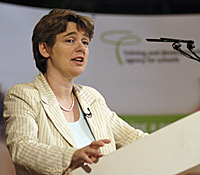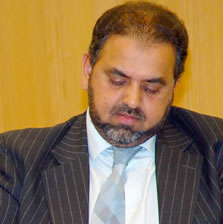By Liban Ahmad
Jack Straw’s comments on the veil also known as niqab have reinvigorated the debate about diversity and the role of Muslim community in tackling the threat from terrorism .The reaction to the British Labour politician’s comment were varied. In the eyes of a prominent conservative MP, it underscores how sensitive ‘Muslim community’ has become to criticism.
“At its very least, there is a growing feeling that the Muslim community is excessively sensitive to criticism, unwilling to engage in substantive debate. Much worse is the feeling of some Muslim leaders that as a community they should be protected from criticism, argument, parody, satire and all the other challenges that happen in a society that has free speech as its highest value, “wrote David Davis, the Shadow Home Secretary, in the Sunday Telegraph.
In his piece David Davis pointed out that the government’s response to overreaction from some members from the Muslim community in the wake of Danish cartoons was inadequate adding that “the greater risk for our society is that legitimate discussion is being closed down by knee-jerk reactions to questions which, however insensitively they may be expressed, contain real issues that merit public debate. Ironically, such a debate would offer an opportunity for all sides to better appreciate – whether or not they agree – the range of opinion expressed.”
Ignoring diversity within a community leads to generalisation, oversimplification and lumping community of communities together. Like other immigrants and migrants from other faiths, Muslim communities had come to UK from different countries, cultures and socio-economic backgrounds. Leadership of influential Muslim organisations consulted by successive British governments disproportionately belong to Muslim communities who came to this country more than two generations ago. Globalisation, civil wars and cheap flights, among other factors, have contributed to the increase in the number new Muslim communities in the United Kingdom. It is a failure to take these facts into account that makes the use of the two words “Muslim Community” a barrier to a debate with government, politicians and policy makers about the role of Muslim communities in countering the terrorist threats facing Britain. Uncritical acceptance of politicians’ views about nature of communities and their ability to tackle challenges ranging from terrorism, brainwashing to radicalisation of the young is—to borrow Stanley Cohen’s phrase—‘ moral panic’ in disguise.
Divided on Strategy
 |
|
Ruth Kelly: Tough words, incoherent policy
|
David Davids’ article in the Sunday Telegraph coincided with an interview Lord Ahmed of Rotherham gave Sunday programme on Radio 4, broadcast on 15 October 2006. The interview was said to have been provoked by a speech delivered by Ruth Kelly, Secretary of State for Communities and Local Government, in which, quoting Gordon Brown, she said: “Unless moderates can establish themselves at the centre of their communities and faith, extremists could grow in strength and influence.” From this very quote one can infer reluctance or meekness on the part of ‘moderate Muslims’. The government will fund Muslim community organisations that are deemed to be “proactive ….in tackling in tackling extremism and defending our shared values.” What about if organisations depend on sources of funding other than local authorities’ funds?
Lord Ahmed’s interview highlighted a schism between the government and influential Muslim leaders .“…if you look at every bit of rhetoric that has been coming out of the government departments and very senior people, it has been sort of targeting at the Muslim community leadership and keeping the Muslim community on the back foot criticising them and that has opened up a wave for the f or neocons, the right wing people who have attacking the Muslims. Islamophobia has become a contemporary form of racism and frankly anyone wants to have a go, either you talk about fanatics and or you link them with Islam and you attack entire community, demonisation of religion, demonisation of entire community,” Lord Ahmed told Sunday.
Muslims living in deprived communities who are accustomed reading Muslim-bashing headlines, and opinion polls that paint a picture Muslim communities as terrorist symptahisers, will find consolation in Lord Ahmed’s words. Why?
 |
|
Lord Ahmed: Let down by establishment?
|
Lord Ahmed points to what he regards as a trend of underachievement that blights Muslim children—“ Muslim children are achieving less than half the percentage in five GCSE grade a-c compared to Indian children or Chinese children .They are the lowest achievers…”--- continual government interference—“ so much interference from people who are saying ‘ spy on your children’”—and absence of policies aimed at tackling “ parallel communities, deprivation, ghettoes that exist within the Muslim communities, whether it is in Bradford, in Birmingham, in Luton or elsewhere in the United Kingdom.”
Why is Lord Ahmed calling for a more proactive role for the government in tackling major social and economic problems facing Muslim communities when senior members of the cabinet hinted at loss of confidence in the Muslim leaders due to perceived emergence of an intolerant breed of Muslim leaders?
Managing Diversity in Multicultural Britain
The threat from terrorism to Britain calls for a radical approach to managing diversity within communities. Such an approach will be distinctive in the sense that diversity will have to be valued as long as it does not standing in the way of posing the candid questions about policies of the government of the day and attitudes of the communities towards pluralism and cultural diversity. Emphasis on cross-cultural understanding and exploring betters ways to cement community cohesion are two strategies that will provide a basis for strategy that will contribute towards managing diversity in Multicultural Britain.
New situations call for new approaches. In the light of government’s criticism of Muslim leaders, micromanaging diversity issues may look like a sound option that will balance the ‘leadership deficit’ within Muslim communities. Such an approach will, in my view, be counterproductive for it is not based on a coherent understanding about diversity within immigrant communities from Muslim countries.
The Somali community in Manchester is a handy example that can shed light on the outcome of diversity policy that is unwittingly based on a stereotype. Manchester City Council organised two conferences in 2003 and 2004 for the Somali community groups. It was a genuine attempt to solve appararent factionalism that plagued Somali community in Manchester. Representatives from more than 10 community-based organisations working within 1 KM square attended the conference. Out of the two conference emerged the Somali Consultative Forum made up of representatives from community organisations. The Forum aims to forge a working relationship between the Somali community groups and service providers. Manchester Council Community Relations was entrusted with the task further developing the Forum and holding monthly meeting for community organisations
The assumption behind such a community empowerment policy was acceptance that clan based community organisations can not be done away with: no local authority can bring fractious, clan based community groups together without viewing their differences as diversity. But this approach has widened the adverse impact of social exclusion within the Somali community in Manchester and deepened the perception about community groups as divisive, clan based groups that continue to deplete the remaining reserves of social capital. The squabbling community groups are part of Somali culture, goes the unexamined assumption. But the picture is more complex than the assumption. Voluntary organsations did not exist in Somalia. The civil war and attendant trauma asylum seekers and refugees had to undergo and the prolonged statelessness in Somalia have bred justified mistrust within social groups. Intra-clan trust— “bonding social capital” to use distinction made by Professor Robert Putnam, author of Bowling Alone, --based “on ties to people like you” (Clansmen and clanswomen in Somali socio-political parlance) has provided a basis on which community organisations thrived in Manchester. This type of social capital has not been exploited further to create a bridging social-- “ ties to people unlike you – people of different race,[people of different clan] people of different age, or people of different gender.”
In 2005 spate of violence against vulnerable members of the Somali community in Manchester revived questions about united community representation. A group of young Somali men and women who are not linked to any of the Somali community groups pooled their efforts to interview victims of the violence. The organised a community meeting held in a Mosque. The Somali community members view the mosque as nonpolitical, non-tribal, impartial entity that can contribute to efforts to forge communal trust. The mosque meeting cooled the fraying tempers of community members and organised successive meeting with the Greater Manchester Police. The wider but unacknowledged outcomes of the Mosque initiative were the decrease in the violence against Somalis and a boost in the confidence of the community to address violence against its vulnerable members. The potential of the mosque to address, violence, social exclusion and cement community cohesion has not been tapped properly.
A development worker with a local threatre company that has developed a project for Somali youth in Manchester said he had been amazed to see Somali youth identifying themselves not along clan lines but as young, ambitious members of the community in 21 century UK. They set up an amateur troupe of actors and staged a play at Zion Centre in March. “All I had read about Somali communities and their social organisation has been challenged by what I have seen in Moss Side and Rusholme,” he told me.
Few months Policy Studies Institute teams came to Moss Side for preliminary feedback on research PSI has conducted on Everyday Interactions in Diverse Communities. One Somali woman interviewee expressed anxiety and fear about living in Moss Side whereas a Somali man, in his forties, said that life in Moss Side was not a problem.
One participant in the feedback session pointed out the significance of reintroducing a locally distributed newspaper that covered community news about several wards in the city. Before it ceased publication Area News played a major role in community dialogue.
The threat of terrorism to the United Kingdom can not be discounted. Joint efforts between politicians, Muslim community and religious leaders are needed to ensure that young Muslim men and women are not only at risk of social exclusion but also less susceptible to terrorist exploitation and brainwashing. British government’s policy of working with Muslim communities ought to be coherent rather than prescriptive.
Liban Ahmad
London, UK
E-mail: [email protected]
| The opinions contained in this article are solely those of the writer, and in no way, form or shape represent the editorial opinions of "Hiiraan Online" |